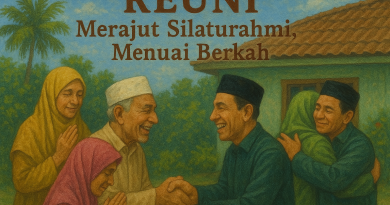The Economic Value of Biodiversity from the Perspective of Islamic Economics
By Dr. Abdul Wadud Nafis, LC., MEI
The economic value of biodiversity in Islamic economics reflects a harmonious relationship between humans and nature, based on the principles of tawhid (the oneness of God), khilafah (human stewardship of the earth), and maslahah (public interest). The following is a systematic explanation of biodiversity’s economic value from the Islamic economic perspective:
1. Basic Islamic Economic View of Nature
In Islam, the universe—including biodiversity—does not belong absolutely to humans, but to Allah SWT. Humans are entrusted as khalifah (stewards) to manage and preserve ecological balance, as mentioned in the Qur’an:
“It is He who made you successors upon the earth…” (QS. Fatir: 39)
This signifies that all forms of natural resource exploitation, including biodiversity, must uphold the principles of justice, sustainability, and balance.
2. Intrinsic and Instrumental Values
Islamic economics recognizes two kinds of values in biodiversity:
Intrinsic Value: Every living being has value simply because it is a creation of Allah. It should not be destroyed without a legitimate shar’i reason.
Instrumental Value: Biodiversity can provide economic benefits to humans, such as food sources, medicine, and industrial raw materials. However, its use must conform to shariah principles.
3. Islamic Economic Principles Related to Biodiversity
Several key principles must be observed:
Khilafah: Humans have the responsibility to protect and preserve Allah’s creation, including flora and fauna.
Tawazun (Balance): Exploitation must be balanced and must not damage the ecosystem.
Maslahah: The use of biodiversity must bring broad benefit without endangering future generations.
La Dharar wa La Dhirar: One must not harm oneself or others through environmental destruction.
4. Economic Value of Biodiversity
From an Islamic economic perspective, the economic value of biodiversity includes:
Type of Value Explanation
Direct Value Direct use such as herbal medicine, food, or ecotourism.
Indirect Value Ecological functions like pollination, carbon sequestration, pest control.
Existence Value Spiritual and moral value in preserving Allah’s creation, as a form of worship.
Heritage Value Responsibility to preserve biodiversity for future generations (intergenerational equity).
5. Islamic Economic Practices in Biodiversity Conservation
Islamic economics encourages:
- Productive waqf for forest or medicinal plant conservation.
- Agricultural and livestock zakat channeled to support environmentally friendly practices.
- Ethical consumption (avoiding excess) to reduce overexploitation of biodiversity.
6. Contribution to the Sustainable Development Goals (SDGs)
Islamic economic concepts naturally support the SDGs, particularly:
- Life on Land (SDG 15)
- Responsible Consumption and Production (SDG 12)
- Climate Action (SDG 13)
Conclusion
The economic value of biodiversity in Islamic economics is not limited to material benefit but also encompasses spiritual, moral, and social dimensions. Islamic principles guide humanity to preserve biodiversity as a form of worship and responsibility to Allah SWT, as well as a commitment to sustainable human welfare.
References
Chapra, M. U. (2000). The Future of Economics: An Islamic Perspective. Leicester: Islamic Foundation.
Dusuki, A. W., & Abdullah, N. I. (2007). Maqasid al-Shari`ah, Maslahah, and Corporate Social Responsibility. The American Journal of Islamic Social Sciences, 24(1), 25–45.
Huda, N., Rini, N., Mardoni, Y., & Putra, P. (2012). Islamic Macroeconomics. Jakarta: Kencana.
Izzi Dien, M. (2000). Environmental Dimensions of Islam. Cambridge: Lutterworth Press.
Karim, A. A. (2007). Islamic Microeconomics. Jakarta: RajaGrafindo Persada.
Nasution, A. (2000). Encyclopedia of Islamic Law. Jakarta: Ichtiar Baru van Hoeve.
Othman, A. (2018). Environmental Ethics in Islam: Principles and Perspectives. International Journal of Academic Research in Business and Social Sciences, 8(2), 611–621.
Quran. (n.d.). Translation by The Ministry of Religious Affairs of the Republic of Indonesia.
Santoso, H. B., & Yulianti, L. (2021). Konsep Tanggung Jawab Lingkungan dalam Islam dan Implementasinya dalam Pembangunan Berkelanjutan. Jurnal Ilmu Lingkungan, 19(1), 102–110.
Yusuf, M. A. (2014). Islamic Economic Perspective on Environmental Conservation. International Journal of Islamic Thought, 5, 53–60.
Leonardo AI. (2025). Illustration: The Economic Value of Biodiversity from the Perspective of Islamic Economics [AI-generated image]. https://app.leonardo.ai



